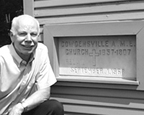 W. Edward (Ed) Orser is Professor Emeritus of American Studies. He came to UMBC in 1969, the new university’s fourth year, and was one of the founding faculty members of the department. He retired as Professor in the Fall of 2011, having served a number of terms as chair of the department. He earned a Ph.D. in American Studies from the University of New Mexico in 1969.
W. Edward (Ed) Orser is Professor Emeritus of American Studies. He came to UMBC in 1969, the new university’s fourth year, and was one of the founding faculty members of the department. He retired as Professor in the Fall of 2011, having served a number of terms as chair of the department. He earned a Ph.D. in American Studies from the University of New Mexico in 1969.
Upon his retirement, and in his honor, the Orser Center for the Study of Community, Place, and Culture was established at UMBC to foster “innovative collaborations among scholars, students, and local community organizations.” The Center’s Board is composed of faculty from across the disciplines whose research and teaching explore place-based study, especially focused on the Baltimore region. Professor Nicole King directs the Orser Center.
Awards and Recognition
Ed received the UMBC Presidential Teaching Award in 1999 and the University System of Maryland Regents Award for Excellence in Teaching in 2003. The Baltimore Historical Society conferred Historian Honors recognition upon him in 2007.
Teaching and Research
Ed’s teaching and research interests have always been closely connected. His courses on “Community in American Culture” and “American Environments: Landscape and Culture” not only became central parts of the American Studies curriculum, but led to a variety of research projects with students and to themes that became the focus of his own scholarship.
His publications explore the social and cultural dynamics of the Baltimore region. His examination of the phenomenon of massive racial change in West Baltimore during the 1950s and 1960s led to the first book-length study of blockbusting and its consequences in post-World War II cities: Blockbusting in Baltimore: The Edmondson Village Story (University Press of Kentucky, 1994, 1997).
A collaborative research and teaching project with Professor Joseph Arnold of the History Department, working with students in both American Studies and History, resulted in an on-campus exhibition and to the co-authored publication of From Village to Suburb: Catonsville, 1880-1940 (Donning Publishing Company, 1989). His first book, Searching for a Viable Alternative: The Macedonia Cooperative Community, 1937-1958 (Burt Franklin, 1981) explored the effort by a group of pacifists to establish an alternative community in North Georgia during and following World War II. Articles on related topics have appeared in such journals as American Studies, Church History, the Maryland Historical Magazine, the International Journal of Oral History, the Public Historian, and the Journal of Urban History. Ed’s interest in environmental history in the Baltimore area resulted in publication of The Gwynns Falls: Baltimore Greenway to the Chesapeake Bay (The History Press, 2008) and in the article, “A Tale of Two Park Plans: The Olmsted’s Vision for Baltimore and Seattle, 1903” (Maryland Historical Magazine, Winter 2003). His public history activity included co-authorship of The Gwynns Falls Trail Master Plan (with Diana Balmori, et al., 1995).
Ed has taught American Studies in a variety of international settings. In 1990-1991 he served as Senior Fulbright Lecturer at the University of Zagreb in Yugoslavia. In the Spring semester, 2007, he taught in the American Studies department at the University of Swansea in Wales. Prior to coming to UMBC, Ed served as a United States Peace Corps Volunteer teacher in Ethiopia.
Service
In his substantial service role at UMBC he was President of the Faculty Senate (1996-8) and a member of numerous university committees. He chaired the campus curriculum review committee, the Undergraduate Council, and the General Education Committee, which undertook evaluation and revision of the university’s graduation requirements.
Current Projects
In retirement Ed serves as president of the Friends of Maryland’s Olmsted Parks & Landscapes, a preservation and advocacy organization, and as Coordinator of the Urban Resources Initiative Internship program, which places interns with projects in Baltimore’s Department of Recreation and Parks and the Parks & People Foundation. Ed and his wife Jo live in the Hunting Ridge neighborhood of Baltimore.